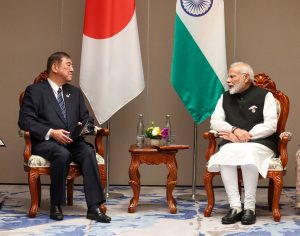Significantly, in 2024 two major Asian democracies, Japan and India, celebrated the 10th anniversary of their Special Strategic and Global Partnership. This special relationship, forged under Prime Minister Narendra Modi and former Japanese Prime Minister Abe Shinzo, significantly increased strategic collaboration between India and Japan. In addition to their business relationship, India and Japan share a long history of Buddhism and a close people-to-people bond. Japan and India’s bilateral partnership is growing and demonstrating a variety of cooperative efforts. 2024 also saw the re-election of Modi as India’s prime minister for a third term and the election of Japan’s new Prime Minister Ishiba Shigeru.
India and Japan have similar perspectives on economic growth, strategic objectives, and regional security. The two countries now work together on several fronts, including trade, investments, technology, security, and defense, as the relationship has developed into a strategic partnership in recent years. India and Japan are leading efforts to keep the Indo-Pacific region stable in the current geopolitical environment, which has made the region a focus of international attention.
Security ties between the two nations have been expanding, and 2024 saw several notable developments. The revised National Security Strategy Document (NSS) of Japan in 2022 showcased ambitions for cooperation with India to grow. Japan and India do not currently have any direct bilateral concerns, and have every incentive to continue strengthening their partnership given that China continues to be both nations’ primary and immediate security worry.
Dr S. Jaishankar, India’s external affairs minister, travelled to Japan in March 2024. Jaishankar and his then-counterpart, Kamikawa Yoko, reviewed the India-Japan special strategic and global relationship during the 16th India-Japan Strategic Dialogue. Strengthening the semiconductor supply chain and promoting India as a dependable location for chip manufacturing were two of Jaishankar’s top concerns during his trip to Japan. The two ministers pledged to actively promote collaboration in defense technologies and equipment, and they applauded the holding of coordinated security training exercises by all of their armed forces. Additionally, the two ministers decided to expand the chances for cooperation in space, the internet, and other developing fields.
Japan and India share the goal of creating a “Free, Open, and Inclusive Indo-Pacific.” To safeguard maritime routes, the two militaries have taken an active part in joint naval exercises, intelligence sharing, and the encouragement of freedom of navigation across the region. Their common concerns about China’s assertiveness in the Indo-Pacific are strengthened by the convergence of national interests, which results in greater cooperation in crucial areas including military, intelligence sharing, and maritime patrols.
Regarding their defense ties, India and Japan also conducted the third 2+2 Foreign and Defense Ministerial Meeting in New Delhi in August 2024. Jaishankar and Defense Minister Rajnath Singh represented India. The meeting was attended by Yoko and Japan’s then-Minister of Defense Kihara Minoru.
Defense cooperation serves as a key tenet of the India-Japan Special Strategic and Global Partnership. The determination to expand and diversify defense exchanges is demonstrated by the participation of Japanese in in Tarang Shakti, the India Air Force’s first multilateral exercise.
One of the more remarkable aspects of India-Japan defense cooperation in 2024 was the Memorandum of Implementation (MoI) the two sides signed for the cooperative development and manufacturing of the Unified Complex Radio Antenna (UNICORN) mast, a cutting-edge integrated communication system. Sibi George, the Indian ambassador to Japan, and Ishikawa Takeshi, the commissioner of the Japanese Ministry of Defense’s Acquisition Technology and Logistics Agency, were present at the formal signing and exchange of the Memorandum of Understanding in Tokyo on November 15.
By lowering the radar cross-section of antennas, the UNICORN mast, a next-generation naval mast system, improves the stealth qualities of naval platforms and unifies several communication technologies. This endeavor is the first instance of the two countries working together to develop and produce defense equipment.
In 2025, India and Japan will delve deeper into their defense and security ties.
The goal of India-Japan collaboration amid their “Vision 2025 Special Strategic and Global Partnership” is to advance international peace and prosperity in the Indo-Pacific area. Establishing the foundation for further economic, industrial, and diplomatic collaboration between the two countries, the Japan-India Vision 2025 program has grown to be a pillar of bilateral ties. The Vision 2025 framework intends to further cement Japan’s position as India’s principal economic partner by aiming for 5 trillion yen in Japanese investments by 2027. This expanding partnership is indicative of a substantial change, especially in the industries drawing Japanese investment, such as manufacturing, electronics, and information technology.
India views a more powerful Japan as a welcome and advantageous addition to New Delhi’s geopolitical calculations, particularly concerning China and the Indo-Pacific. Improving defense cooperation with India is likely to be a major priority under Ishiba’s direction. Japan’s defense commitments under the Quad framework may be revitalized by Ishiba’s proactive attitude, which would also improve collaboration on humanitarian and joint military exercises.
The future of India-Japan relations continues to be a key issue in the quest for peace, stability, and prosperity in the Indo-Pacific area as the world monitors Ishiba’s next actions.

































